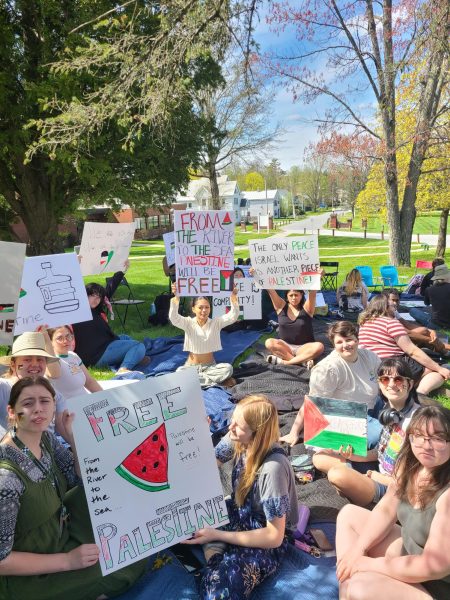A note from the Editor…
Last week, Lyndon and Johnson each hosted an event to celebrate the finalized branding for Northern Vermont University. With cookies, cider, t-shirts and custom NVU M&Ms, participation meant not only getting into the spirit of the oncoming unification but also the promise of free stuff.
Still, not a whole lot of students actually showed up.
It is possible that most of the blame for that lies with bad timing — the Johnson event took place at 4 p.m. on a Wednesday. I had to miss the first half hour of my evening class to attend, and I don’t blame other students for not wanting to do the same.
Unfortunately, low student participation is very much a Johnson trend, even in cases when it can mean that the voices of the student body go unheard.
Over the last couple of months, a dedicated team of faculty has been putting together a new Core Curriculum for Johnson and Lyndon to share once the two colleges become NVU. This gen-ed requirement will replace the current model of the four “perspectives.”
While many current students will likely be unaffected by this new gen-ed, myself included, many others still have a few more years to deal with the requirements that come with getting a degree. Would it be unreasonable to think that those students might want a say in what those requirements look like?
To find the answer, we need only look at the number of students who showed up to the multiple student-focused meetings about the new gen-ed offered earlier in the semester: zero.
As first a staff member and now the editor of this paper, I’ve had the chance to hear a lot of behind-the-scenes information about the goings-on of JSC. As a student, I’ve heard a lot of general opinions from my friends and other members of the student body. Most of the time, the two perspectives are wildly different, with distinct priorities and concerns.
While faculty and staff are trying to create new initiatives and events that will be forward-thinking and good for the college as a whole, students are just trying to get through classes and wondering why so few of the Creative Audience events actually line up with their schedules. While the administration is trying to figure out how to improve retention and get the student body excited about events on campus, students are deciding which potentially interesting events they would rather skip to get a much-needed evening of downtime.
In the end, I think it comes down to a simple split in focus: the people who have dedicated their working lives to the college are thinking about the future, while the people who are only here for the few years it takes to earn their degree before they have to start the panic-inducing process of building a life after school are thinking primarily about the now. Both are completely valid perspectives, but the discrepancy between their results can be stark and perplexing to the other side.
When you’re struggling to balance your homework and your job and your friends and your own sanity, it can be really hard to think about the future of a college that you likely won’t even be part of. As an overly stressed student myself, I fully understand this.
However, I have also heard students complain about the lack of fun things to do on weekends and the parts of their curriculum that they see merely as stupid hoops they have to jump through for their degree. My dad often liked to tell me, “Don’t complain unless you’re willing to do something about it,” and I think more people should take that to heart.
If you think that the Creative Audience program should be restructured so that it isn’t a disproportionately difficult task for commuters and people with intense extracurricular obligations, don’t just complain to your friends about it. When an email goes out asking for student input at a meeting about the new gen-ed, pay attention and attend the meeting so you can say something.
On the other hand, meetings about important information should be offered at times that students will likely be able to attend. Obviously schedules can and do vary, but 1 p.m. is probably not the best time, considering how many classes start exactly then.
I was hesitant to write about this subject, because I understand that it’s a complicated problem with no clear solution, but I think the disconnect between student and administrative opinion is something that can seem either insurmountable or nonexistent if you haven’t seen both sides.
Most students will probably never be persuaded to get excited about a gen-ed that they only see as an obstacle to overcome, and faculty and staff will probably always hope for more student participation than they’ll get, but maybe, with a bit more communication, we could find some middle ground so we can all get excited together.
—Cayla Fronhofer, Editor-in-Chief




